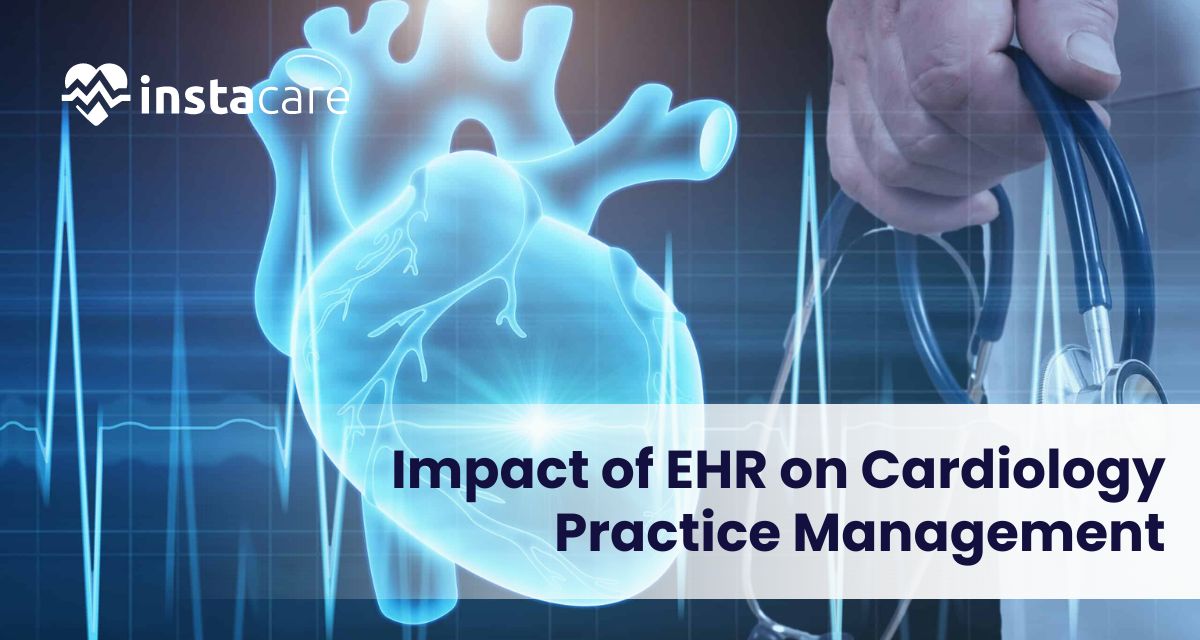Last updated on Friday, 14, June, 2024
Table of Contents
Understand The Impact of EHR on Cardiology Practice Management
In today’s ever-changing world of healthcare, the Impact of EHR on Cardiology Practice Management comes as one of the revolutionary moments. As the need for high-quality care increases, it is fundamentally important to understand how cardiology practices have been deeply impacted by EHR systems. This paper goes on to expound more on the multidimensional advantages of EHR implementation; it provides an overview of patient care, administrative task optimization, communication strengthening, and performance enhancement in driving continuous improvement.
Facilitating Patient Care with EHR Systems
Ensuring the best in class patient care is the core of every cardiology practice. EHR systems present key infrastructural support in this pursuit by providing a centralized platform for storing, managing, and accessing the health information of a patient. Medical record digitization would enable cardiology practices to ensure continuous care, since a situation where healthcare providers from the same practice can instantly access comprehensive patient histories, diagnostic tests, medication records, and treatment plans would have been created. This availability would be tantamount to more rapid and better decisions concerning diagnosis and treatment, which would ultimately lead to better patient outcomes.
In addition, EHR systems can help patients get involved in their health journey by offering them secure access to their medical records, test results, and treatment plans. Using patient portals and mobile apps, they can easily communicate with their healthcare providers, as well as schedule their appointments, request prescription refills, and access educational resources. This approach, focusing on the patient, will enhance their involvement in the given process and create a transparent relationship between them and the providers.
Streamlining Administrative Tasks
As already mentioned, other than ensuring better care for patients, EHR systems turn around the way cardiology practices perform administrative tasks. Normally, healthcare providers deal with a lot of paperwork covering functions from making appointments to processing related insurance claims. This is, however, different when EHR software has already been implemented. The processes are streamlined and appropriately automated to bring out efficiency in their functions. Today, administrative employees can manage patients’ intake forms easily using digital tools, send automated appointment reminders, and even submit electronic prescription requests.
Additionally, EHR systems provide easy integration with third-party billing and coding software to support clear and on-time reimbursement for services rendered. These systems automate coding and highlight potential errors to reduce the risk of billing errors, which in turn reduces inefficiencies in the revenue cycle. In such a manner, cardiology practices are capable of leveraging their cash flow, targeting resources accurately, and attaining financial stability.
Better Communication and Collaboration
Communication and collaboration are vital to the delivery of quality patient care, and that is not an exception in cardiology, where teamwork is an interdisciplinary component. EHR systems boost communication and collaboration between all members of the care team, specifically cardiologists, nurses, technicians, and additional support staff. Through secure messaging platforms, real-time updates, and information sharing functionalities within the systems, health providers can easily share the most critical patient information, make clinical decisions, and consult with information care providers.
EHR systems further facilitate easy transition of care across various healthcare facilities, such as hospitals, clinics, or rehabilitation facilities. Since all information is kept in a single repository, all the members of the care team will have access to this data no matter where the patient is currently situated. Such interfacing positively enhances better care coordination, brings down medical errors, and improves patient safety.
Better Data Analysis and Reporting with Impact of EHR on Cardiology
Data-driven insights are at the core of every successful cardiology practice management system, and they drive continuous improvement. EHR systems arm cardiology practices with powerful data analytics tools for monitoring key performance indicators, patient outcomes, and continuous improvement. Making use of analytics, cardiology practices can inform decisions, impact evidence-based practices, and measure the effectiveness of interventions.
Furthermore, data analytics allow EHRs to breed integrated reports and dashboards, whereby cardiology practices can appreciate the data trends, visualize areas of improvement, and demonstrate regulatory compliance. It allows providers to optimize the process, allocate resources efficiently, and deliver value-based care.
Compliance and Security
In an age of growing regulatory requirements and consistent concerns around security, EHR systems represent a powerful cardiology solution for compliance and patient data protection. For the practice, the systems provide improved security chiefly by meeting privacy requirements under the Health Insurance Portability and Accountability Act and applying advanced techniques of encrypting sensitive data. The systems also have role-based access, audit trails, and data encryption protocols that serve to minimize risk from unauthorized access, data breaches, and identity theft.
The EHR also helps perform periodic security audits and vulnerability assessments to identify, beforehand, areas vulnerable to security threats. By being updated on the threats associated with cybersecurity, the cardiology practice can ensure privacy, integrity, and availability of the patient’s information. In fact, this commitment to data security not only protects the privacy of the patients but also builds trust and maintains the reputation of the practice, Impact of EHR on Cardiology has revolutionize the system.
Going All-Digital
Cardiology practices are increasingly adopting EHR systems since they represent a basic step in achieving competence at work and ensuring optimum patient care delivery. The power of technology liberates healthcare providers to outpace traditional challenges, standardizes workflows, and maintains cardiology practice management. Besides, EHR systems act as a pivotal point for innovation, as they allow cardiology practices to adopt emerging technologies such as telemedicine, remote patient monitoring, and artificial intelligence in enhancing patient engagement, improving clinical outcomes, and driving sustainable growth.
Conclusion
EHR integration has transformed cardiology practice management by providing multiple benefits, from improved patient care and reduced administrative hassles to teamwork and quality data-driven decisions. Cardiology practices will open new vistas of efficiency, productivity, and its reflection in patient outcomes if they embrace EHR systems. As a health landscape, EHRs will play an increasingly pivotal role in shaping cardiology care in the future, driving innovation in transforming cardiovascular service delivery.
FAQs
1-How do EHR systems improve patient care in cardiology practices?
EHR systems improve patient care by providing a centralized and convenient area to manage patient health information. The movement of medical record keeping to the digital space will provide health service providers with comprehensive patient histories, diagnostic tests, records of medications, and treatment plans at the touch of a button. This immediate access will allow for faster and better decision-making, hence improved results of diagnostic tests and treatment outcomes.
2-What administrative functions are streamlined with EHR systems within a cardiology practice?
EHR systems help streamline an entire mass of administrative functions in and around cardiology practices, thus reducing the bulk of paper-based work and ensuring overall efficiency. The primary administrative functionalities that the EHR systems will automatically set off include:
- Scheduling of appointments
- Billing and coding
- Processing insurance claims
- Electronic prescriptions
3-How do EHR systems enhance communication and collaboration among healthcare providers?
Features ensuring communication between every member of the care team are as follows:
- Secure Messaging
- Real-time Updates
- Information Sharing
- Interoperability of data
4-How do EHR systems ensure compliance and data security in cardiology practices?
EHR systems operate under role-based access, so merely the respective personnel with adequate authorization are able to approach the various sections of the patient-related information; this features avoid any risk of information misuse to the patient. EHR systems have detailed audit logs about the access and changes made in the records of patients to maintain a transparent and accountable record of actions.



